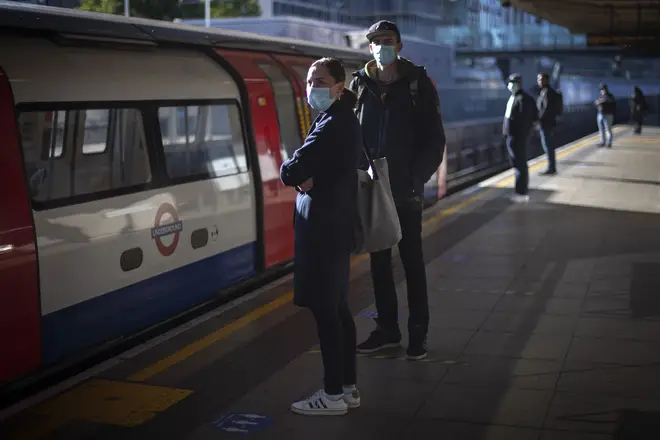
Oli Dugmore 4am - 7am
15 May 2020, 06:45

Commuting will need to be substantially different to ensure social-distancing can be maintained at work when the lockdown eases, a study has found
A new study by the Institute for Fiscal Studies has found returning to work while maintaining social distancing would require much continued working from home and substantial changes to commuting patterns
The IFS said reopening the hospitality sector will create a huge challenge as many workers are heavy users of public transport and cannot work from home.
Read more: Can I get the new coronavirus antibody test? How does it work?
New analysis by IFS researchers - funded by the Economic and Social Research Council - looked at normal (pre coronavirus lockdown) commuting patterns, what they tell us about who would be affected by continued social distancing on public transport, and how policy can ease public transport congestion under continued social distancing.
The research found people in London use public transport to get to work at a higher rate than workers across the rest of the country, but the nature of jobs in the capital means many can be done from home.
Compared to other forms of commuting, public transport use is concentrated at particular times, especially in London and the South East, said the report.
Peak commuting times are higher in London and the South East and those periods are concentrated with longer average journeys.
The study suggested encouraging people to work different shifts or make use of other forms of transport will be particularly important in London and other urban areas.
Read more: Government faces pressure over plans to reopen schools
Listen & subscribe: Global Player | Apple Podcasts | Google Podcasts | Spotify
Younger workers are most reliant on public transport to get to work, with almost a fifth of those aged 16-24 using it compared to just 9% of workers aged 55 and over.
In London, almost two out of three young people commute to work by public transport, compared to 40% of those aged 55 and over, the study indicated.
Workers in industries such as finance are more able to work from home and more likely to have taken public transport to work in normal times, so getting workers in these sectors to continue to work from home will be important, said the report.
Read more: First coronavirus antibody test approved in UK is '100% accurate'
Alex Davenport, a research economist at the IFS, said: "Returning to their work, while maintaining social distancing, will clearly be difficult for those who commute using public transport.
"This is particularly true in London, and especially so among younger workers in London.
Read more: House prices could take a year to recover from coronavirus
"Fortunately, many who previously used public transport are able to work from home, such as those working in finance.
"If social distancing on public transport is to be achieved then getting these workers to continue to work from home will be very important.
"In contrast, reopening the hospitality sector will create a particular challenge as many workers in this sector cannot work from home and were relatively heavy users of public transport to get to work."
Read more: Universities 'may be at risk' due to reliance on Chinese students

DLR Commuters "Throw Violent Man Off Train"
Tan Dhesi, shadow rail minister, said: "This analysis shows we need a comprehensive transport plan to get our country moving again when we come out of lockdown, not the confusing and contradictory advice we are currently getting from the Government.
Read more: Teachers' unions call on Government to 'step back' on reopening schools
"The footage of people packed onto public transport this week was deeply worrying, but it was unsurprising after Boris Johnson ordered a return to work with just 12 hours' notice, and no official guidance on how workers can keep safe and no measures in place to deal with demand."